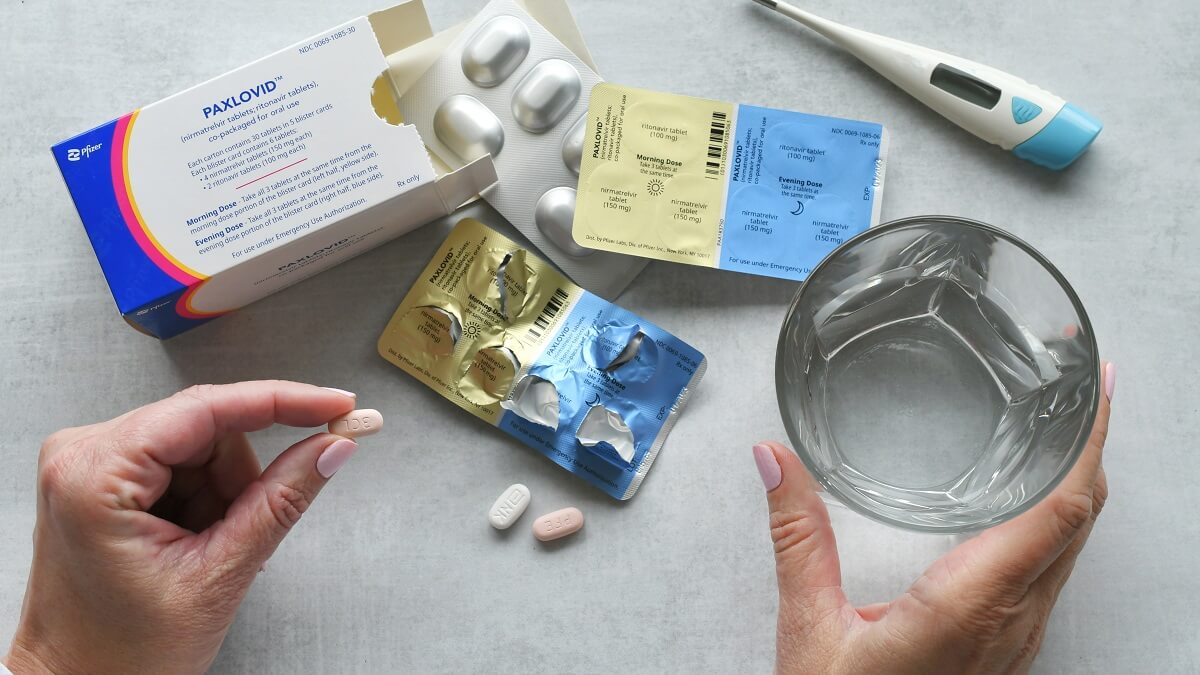Australia’s rules on who can get affordable COVID-19 antivirals are “excessive” and should be relaxed, according to several prominent scientists.
Antivirals have been shown to reduce the chance of hospitalisation or death by almost 90 per cent in vaccinated people, and are widely available in Europe and the United States.
In Australia, a person with COVID must be 70-plus, or above 50 and have two serious medical conditions to get antivirals – like Paxlovid and Molnupiravir – under the Pharmaceutical Benefits Scheme (PBS).
People 18 and over who are immunocompromised, and First Nations people over 30 with one ‘risk factor’ are also eligible.
The guidelines for who can receive COVID antivirals are set by the Pharmaceutical Benefits Advisory Committee (PBAC).
If you qualify, Paxlovid costs about $7 for concession card holders and around $40 for others covered by PBS.
If your GP considers you high risk, but you don’t fall within the government guidelines, the cost can run to more than $1000.
“The restrictions on Paxlovid use are excessive and should be changed prior to our next wave,” University of Melbourne epidemiologist Professor Nancy Baxter said.
Chris Burrell was just a few years short of qualifying for antivirals under government guidelines when he fell ill with COVID this month.
“I think all the focus has been on vaccines and they haven’t addressed antivirals,” said Mr Burrell, who runs a stockbroking firm.
Mr Burrell has come up against these guidelines before.
His 21-year-old daughter Georgia got COVID last year and got very ill, very quickly, shortly after recovering from a bad flu, and glandular fever, and her endometriosis was causing her extreme fatigue.
Mr Burrell feared she may develop long COVID, and forked out $1100 for Paxlovid pills.
He said the medication made a “quite dramatic” improvement in her condition.
Widespread use ‘makes no sense’
But not everybody agrees the eligibility criteria should be widened.
Infectious disease specialist and director of the Doherty Institute Professor Sharon Lewin said the current guidelines are based on scientific evidence.
“The evidence we look at is, ‘What benefit do you get from the antivirals?’ The government then weighs up the benefit, against the adverse risk and the cost,” Prof. Lewin said.
“Calling for widespread use of antivirals makes no sense when you look at where you get the best benefit for use. The best use of this medicine is in people who are high risk and that’s where we need to focus our efforts.”
The federal health department said the current guidelines were recommended by PBAC and defended the access in Australia.
“Eligibility will be expanded further from 1 April 2023, but any further changes would need to be based on recommendations of the PBAC, not individual scientists,” the statement said.
“Other countries such as England, the United States and New Zealand have also made oral antivirals available to COVID infected individuals in the community who are at higher risk of developing severe disease requiring hospitalisation.
“Adjusted for population the utilisation of oral antivirals in Australia is only marginally lower than that in the US.”
Up to 12 March, more than 734,170 PBS prescriptions for COVID-19 oral treatments have been dispensed.
Reducing long COVID risk
Professor Mike Toole, associate principal research fellow at the Burnet Institute, wants the guidelines to change, in a bid to reduce the chance of long COVID.
“There is increasing evidence that having a severe initial illness puts you at higher risk of developing long COVID,” he said.
“So giving antivirals to people in a broader age group may reduce the incidence of long COVID.”
Maria Boulton, president of the Australian Medical Association in Queensland, said guidelines should be reviewed.
“I feel that it’s important to look at what other countries are doing, so that people who need the medication can get the medication,” said Dr Boulton.
“I’m a GP and we’re restricted by the eligibility criteria and if a patient doesn’t fit criteria, we are unable to prescribe it under the PBS.
“I’ve had friends who have been very, very ill with COVID and haven’t met the criteria for antivirals. I also lost an uncle to COVID, and he was very fit and healthy.”
Infectious disease researcher and director of the Burnet Institute Professor Brendan Crabb said at 56, and with no underlying conditions, he would pay the $1000 if he could get a script.
“I realise that makes me very privileged,” he added.
Since the pandemic began, more than 15,000 people have died from COVID in Australia.
Last week, more than 22,000 cases were recorded nationally. Of those, more than 1300 people who had tested positive to COVID were in hospital.
 © 2020 Australian Broadcasting Corporation. All rights reserved.
© 2020 Australian Broadcasting Corporation. All rights reserved.
ABC Content Disclaimer

